Are you looking for a special coin to add to your collection? If yes, then you will love the 1997 Kennedy half dollar. Now, you might wonder, what’s so special about this coin? Read on to learn more!
What Is the 1997 Kennedy Half Dollar Made Of?
The 1997 Kennedy half dollar is made of 75% copper and 25% nickel. However, there’s also a special proof set of the 1997 Kennedy half dollar made of 90% silver and 10% copper.
The 1997 half dollar is part of the Kennedy half dollar series first issued by the US Mint in 1964. In its first year of production, the coin was made of 90% silver and 10% copper. However, from 1965 to 1970, the silver content was reduced to 40%, and the copper content increased to 60%.
The silver content was removed from 1970 to the present, making the current half dollar have 75% copper and 25% nickel.
You might wonder why the US Mint would reduce the silver content and ultimately remove it from the 50-cent coin.
The answer is that the Kennedy half-dollar coin was popular during its first production. Because of this, people didn’t want to spend the new half-dollar coin. Hoarding was widespread.
The solution the US Mint saw at that time was to reduce the silver content. Thus, the Kennedy half-dollar has 40% silver in about six years. Yet, this didn’t work. There were still a lot of people hoarding the 50-cent coin.
Finally, due to the increasing price of silver and the hoarding problem, the US Mint completely removed silver from the 50-cent coin.
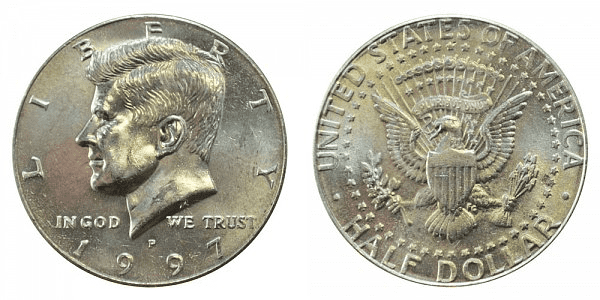
The 1997 Kennedy has used the same design ever since it was first produced. Gilroy Roberts designed the coin’s obverse, while Frank Gasparro designed the reverse. Roberts and Gasparro didn’t have much time to create new designs. So, they used existing designs to use in the new 50-cent coin.
The obverse features the picture of John F. Kennedy, the 35th president of the United States, who was assassinated in 1963. Inscriptions on the obverse include LIBERTY, IN GOD WE TRUST, 1997, and mint mark.
The reverse of the 1997 Kennedy half-dollar features a design similar to the presidential seal. You have many images that have unique meanings. You have the eagle, a branch of olive, a bundle of arrows, a banner, and stars. Inscriptions include UNITED STATES OF AMERICA, HALF DOLLAR, and E PLURIBUS UNUM.
The 50-cent Kennedy, although popular, didn’t make it well in circulation. As a result, the regular Kennedy half-dollar was discontinued in 2001. However, from 2002 to 2020, special half-dollar coins were still produced for collectors interested in having the coin.
1997 Kennedy Half Dollar Varieties
There are four varieties of the 1997 Kennedy half dollars. They differ based on their content, mint mark, and whether they were made as proof or regular coins.
Here’s a table to show you the mintage figure of each of the varieties of the 1997 Kennedy half dollars:
| Variety | Mint Location | Mintage |
| 1997 P Kennedy Half Dollar | Philadelphia | 20,882,000 |
| 1997 D Kennedy Half Dollar | Denver | 19,876,000 |
| 1997 S Proof Kennedy Half Dollar | San Francisco | 2,055,000 |
| 1997 S Silver Proof Kennedy Half Dollar | San Francisco | 741,678 |
| Total | 43,554,678 |
At the end of 1997, the US Mint produced more than 43 million half-dollar coins. The Philadelphia and Denver Mints produced regular coins, while the San Francisco Mint produced proof coins.
Here’s a deeper look at each of the 1997 Kennedy 50-cent coin varieties:
1997 P Kennedy Half Dollar
Year of minting: 1997
Mint Mark: P
Place of minting: Philadelphia
Quantity produced: 20,882,000
Face Value: $0.50 (fifty cents)
Price: $0.50 to $1 (uncirculated condition)
Mass: 11.30 grams
Diameter: 30.61 millimeters
Edge: Reeded
Designer: Gilroy Roberts/Frank Gasparro
Composition: 75% Copper, 25% Nickel
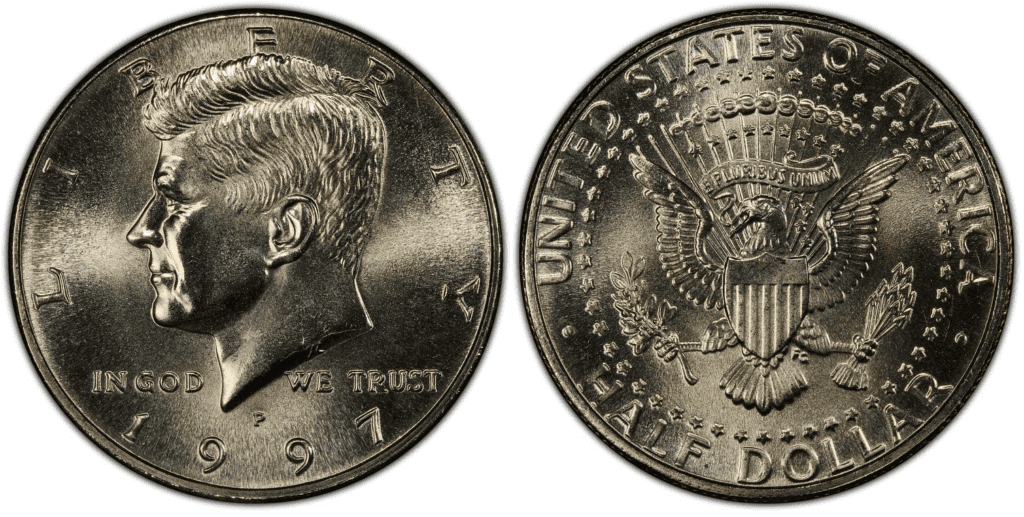
The Philadelphia Mint produced the most number of 1997 Kennedy half dollars. With over 20 million examples, the 1997-P 50-cent is easy to obtain compared to other years of minting.
1997 D Kennedy Half Dollar
Year of minting: 1997
Mint Mark: D
Place of minting: Denver
Quantity produced: 19,876,000
Face Value: $0.50 (fifty cents)
Price: $0.50 to $1 (uncirculated condition)
Mass: 11.30 grams
Diameter: 30.61 millimeters
Edge: Reeded
Designer: Gilroy Roberts/Frank Gasparro
Composition: 75% Copper, 25% Nickel
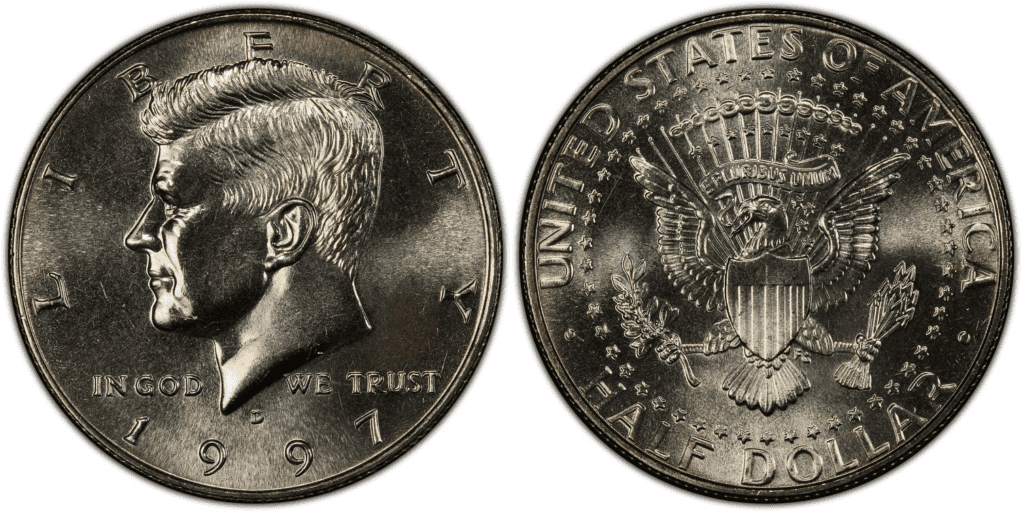
The Denver Mint produced almost 20 million half-dollar coins in 1997. In previous years, from 1994 to 1996, the Denver Mint produced more than 20 million half dollars. This shows you a declining demand for the Kennedy half-dollar coins in the late 90s.
1997 S Proof Kennedy Half Dollar
Year of minting: 1997
Mint Mark: S
Place of minting: San Francisco
Quantity produced: 2,055,000
Face Value: $0.50 (fifty cents)
Price: $9 or more (mint state)
Mass: 11.30 grams
Diameter: 30.61 millimeters
Edge: Reeded
Designer: Gilroy Roberts/Frank Gasparro
Composition: 75% Copper, 25% Nickel
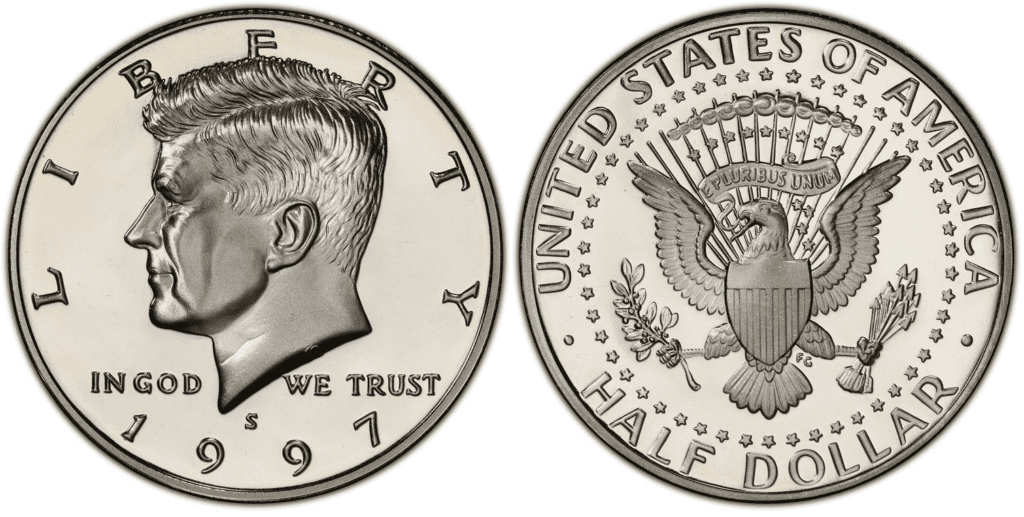
The San Francisco Mint produced more than 2 million proof 50-cent coins. The price may start at around $9. Proof coins are more expensive than regular coins since they are made with more luster, brilliance, and detail.
1997 S Silver Proof Kennedy Half Dollar
Year of minting: 1997
Mint Mark: S
Place of minting: San Francisco
Quantity produced: 741,678
Face Value: $0.50 (fifty cents)
Price: $13 or more (mint state)
Mass: 11.30 grams
Diameter: 30.61 millimeters
Edge: Reeded
Designer: Gilroy Roberts/Frank Gasparro
Composition: 75% Copper, 25% Nickel
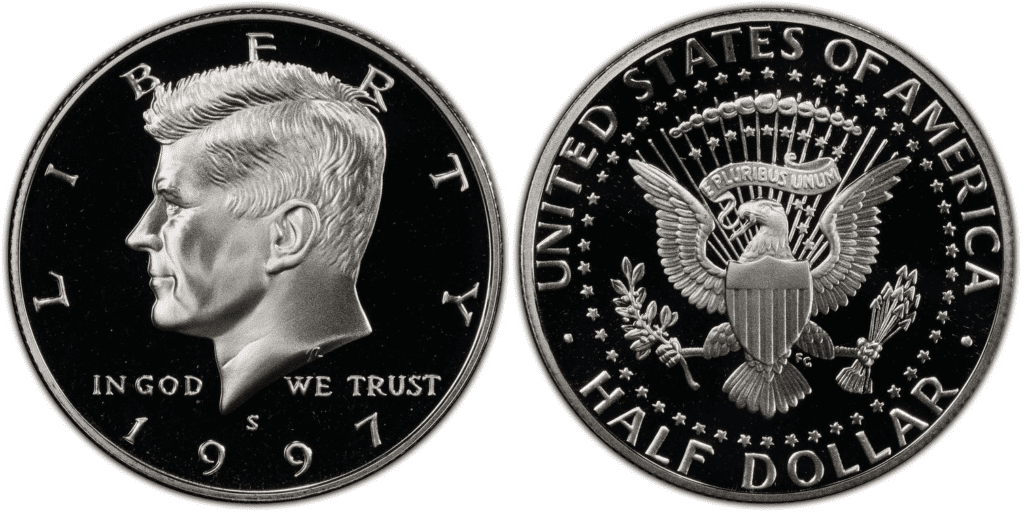
The San Francisco Mint produced more than 700 thousand silver-proof coins. Because of the increasing price of silver, the silver 50-cent proof coin is more valuable as bullion rather than its face value. What’s more, the San Francisco Mint produced high-quality silver-proof coins. There’s no shortage of 1997 Kennedy silver proof half dollars in top grades up to PR70.
List Of 1997 Kennedy Half Dollar Errors
While there were only about 53 million 1997 Kennedy half-dollar coins, some examples were made with errors.
What are they? Here are some of the examples of 1997 Kennedy half-dollar error coins:
Strike-through error
The strike-through can cause different distortions on the surface of the coin. Depending on the type of foreign object that got stuck on the die or planchet, the error may include blurry engraved elements, error lines, and others.
Here’s an example of a strike-through error:
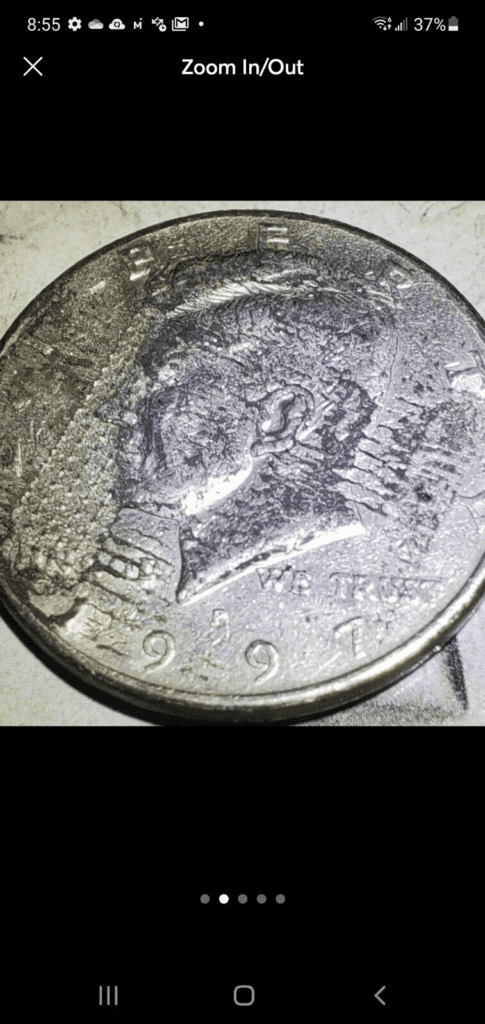
Clipped planchet
During the cutting process of the coin, there was a misfeed of the metal sheets. Because of that, the blade hits a portion of the previously cut coin. As a result, the planchet gets clipped.
Here’s an example of a clipped planchet with a strike-through error as well:
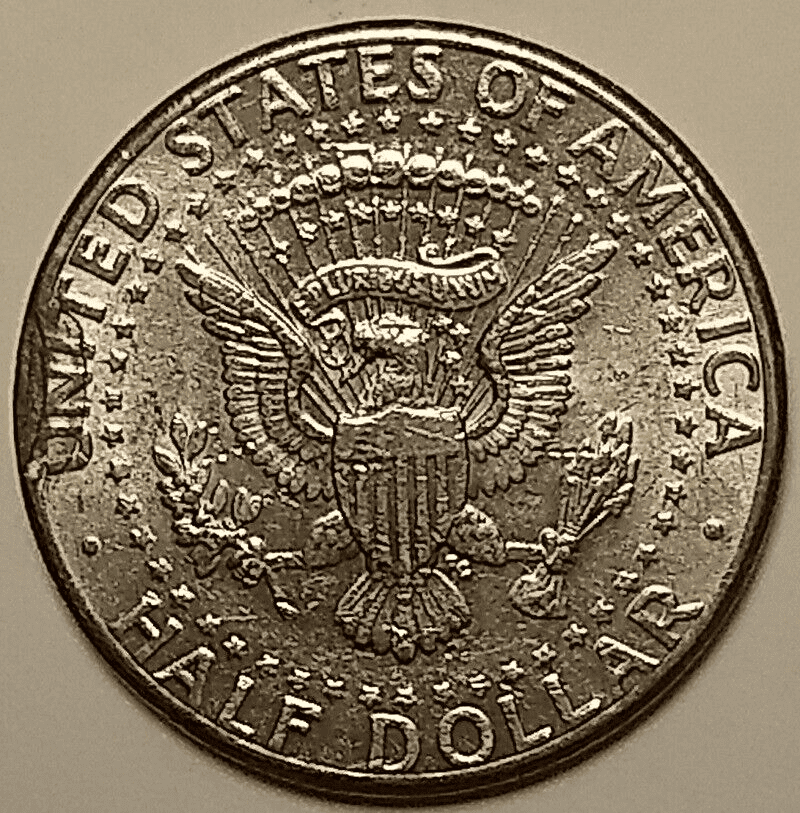
Die crack
Due to the multiple hitting of the die to the coin, the die may break. The die won’t disintegrate immediately. It will simply develop some small cracks. When the broken die hits the planchet, the crack also gets imprinted on the coin’s surface. Usually, the crack manifests itself as a thin and short line just like this one:
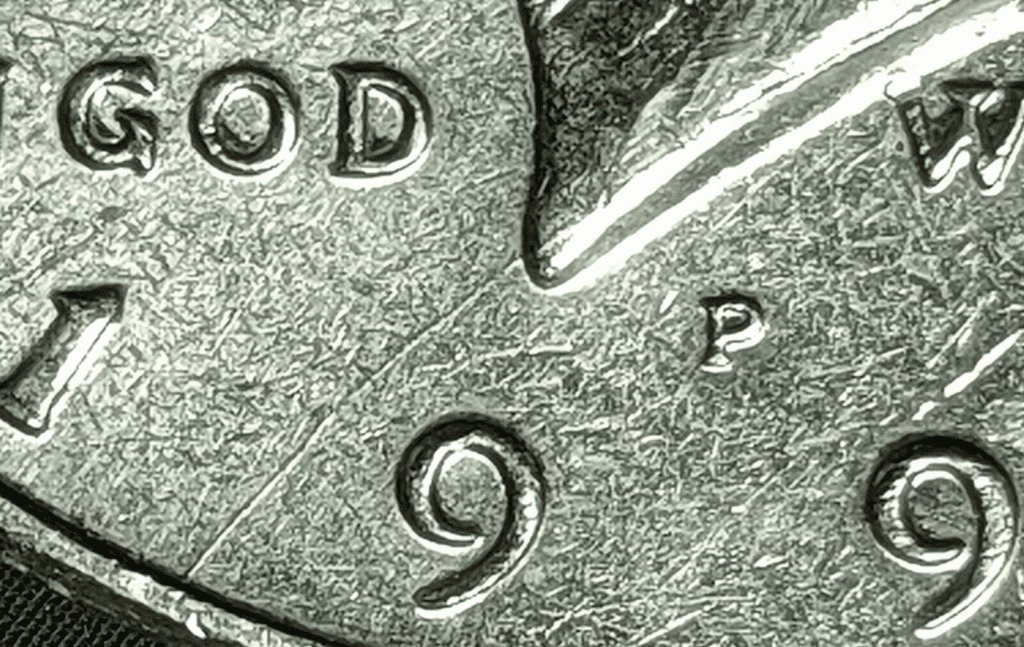
How Much Is the 1997 Kennedy Half Dollar Worth Today?
The 1997 Kennedy half dollar has a face value of 50 cents. Its melt value is lower at around $0.1161. However, the silver 1997 50-cent proof coin has a higher melt value of $7.7114. If you plan to buy a circulated 1997 Kennedy half dollar, you might as well pay around 50 cents to $3.
The true worth of the 1997 Kennedy half-dollar lies in its numismatic value. Thus, you will find that some of these coins were sold for hundreds and even thousands of dollars.
Here’s a table of auction records of the 1997 Kennedy half dollar coins:
| Coin | Condition | Grade | Sold date | Sold by | Value |
| 1997 P Kennedy Half Dollar | Superb Gem Uncirculated | MS 68 | September 7, 2016 | Heritage Auctions | $999 |
| 1997 D Kennedy Half Dollar | Superb Gem Uncirculated | MS 68 | November 29, 2012 | Heritage Auctions | $1,410 |
| 1997 S Proof Kennedy Half Dollar | Perfect Uncirculated | PR 70 – Deep Cameo | May 27, 2003 | Goldberg Auctioneers | $633 |
| 1997 S Silver Proof Kennedy Half Dollar | Perfect Uncirculated | PR 70 – Deep Cameo | May 27, 2003 | Goldberg Auctioneers | $748 |
You may also want to remember that error coins could be more valuable than regular coins because of their uniqueness and rarity.
How Does The Grading System Work?
Professional numismatists joined in the 1970s and established CoinGrading standards, known as the Sheldon Scale. These numismatists now assign grades at key places on the seventy-point scale, using the most regularly utilized numeric points in conjunction with the original adjective grade. The following are the most common coin grades:
- (P-1) Poor – Indistinguishable and probably damaged; if used, must have a date and mintmark; otherwise, rather battered.
- (FR-2) Fair – Nearly smooth, but without the damage that a coin graded Poor often possesses. The coin must have enough detail to be identified.
- (G-4) Fair – Inscriptions have merged into the rims in some areas, and important elements have been mostly erased.
- (VG-8) Very Good- A little weathered, but all primary design elements are visible, albeit faintly. There is little, if any, central detail left.
- (F-12) Good – The item is very worn, yet the wear is even, and the overall design details stand out clearly. Rims are almost completely isolated from the field.
- (VF-20) Very Fine – Moderately weathered, with some finer features still visible. The motto or all letters of LIBERTY are readable. Both sides of the coin have entire rims separated from the field.
- (EF-40) Extremely Fine – Gently used; all gadgets are visible, and the most important ones are bold. The finer details are bold and clear; however, light wear may be seen.
- (AU-50) Uncirculated – Slight evidence of wear on the coin’s design’s high points; it may have contact marks; eye appeal should be adequate.
- (AU-58) Uncirculated Choice – Slight traces of wear, no severe contact marks, almost full mint shine, and great eye appeal.
- (MS-60) Mint State Basal – Strictly uncirculated; no indication of wear on the coin’s highest points, but an unsightly coin with reduced luster, visible contact marks, hairlines, and other flaws.
- (MS-63) Mint State Acceptable – Uncirculated, but with contact scratches and nicks, little reduced shine, but otherwise appealing appearance. The strike is weak to average.
- (MS-65) Mint State Choice – Uncirculated with great mint shine, little contact blemishes, and exceptional eye appeal. The strike is unusually severe.
- (MS-68) Mint State Premium Quality – Uncirculated with superb luster, no obvious contact marks to the naked eye, and exceptional eye appeal. The strike is quick and appealing.
- (MS-69) Almost Perfect Mint State – Uncirculated with perfect brilliance, a sharp and appealing strike, and extremely good eye appeal. A near-perfect coin with minor imperfections in the planchet, strike, and contact markings (seen only under 8x magnification).
- (MS-70) Mint State Perfect – Under 8x magnification, no tiny imperfections are discernible; the strike is crisp, and the coin is perfectly centered on a beautiful planchet. Rarely seen on a coin, this coin is bright and whole, with original luster and exceptional eye appeal.
Where To Buy Or Sell 1997 Kennedy Half Dollar?
You can buy or sell 1997 Kennedy half dollar from the following places:
- Online buy-and-sell platforms – the most popular platforms include Amazon, eBay, and Etsy. However, eBay seems to have the most number of coins for sale.
- Specialized website – you can do a Google search and find websites that could buy or sell your coin. These include JM Bullion, USA Coin Book, and Coin Appraiser.
- Coin dealers – you can find coin dealers in your local area. You can also search for them online. You can use directories and yellow pages, too.
Remember, when buying online, only work with trusted and reputable vendors. There are scammers out there who might try to fool you.
FAQs
Does a 1997 half dollar have silver?
The regular 1997 half dollar coins don’t have silver. Instead, they are made of 75% copper and 25% nickel. However, there’s a special proof coin version of the 1997 half dollar that is made of 90% silver and 10% copper.
How much is a 1997 Kennedy half dollar worth?
The 1997 Kennedy half dollar is worth 50 cents if you’re going to look at its face value. Even circulated 1997 Kennedy half dollars may be around $3 and below. However, half dollars are more expensive. For example, a 1997 D Kennedy Half Dollar was sold for $1,410 on November 29, 2012.
